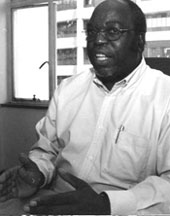
HARARE (FinalCall.com)–The Movement for Democratic Change (MDC) is the opposition to the ruling Zimbabwe African National Union Patriotic Front (ZANU-PF) Party here, but it’s not opposition for opposition sake, according to one of its leaders, Renson Gasela, the shadow minister of Land and Agriculture. But it would be hard to tell that by the headlines in the decidedly pro-government and pro-MDC newspapers on the streets.
“If he does something right, we will support that,” says Mr. Gasela about President Robert Mugabe’s ruling party. “There is legislation that has been passed in parliament we all support.
“Two days ago we supported the Value Added Tax (legislation). We only worried about the ability, because of corruption, to actually connect the money efficiently,” he says.
Mr. Gasela, a former member of the Mugabe government in the Agriculture Department, is under indictment, along with MDC chief Morgan Tsvangirai, for high treason. He won’t talk much about the case that stems from the recent elections because it’s before the courts; he only says he was entrapped and that he’s innocent of plotting to assassinate Mr. Mugabe.
But he talks freely about how he feels that the ZANU-PF government became “more and more repressive, anti-democratic and failed to address the issue of the economy.”
The interim constitution of independent Zimbabwe was meant to transfer power from Whites to Blacks but over the last 20 years, ZANU-PF amended it about 16 times, he says, “making it much more dictatorial and making the country a one-party state.”
The integrated MDC was formed in 1999 as a result of the trade union vowing for more power and because of the country’s declining economy. It was mainly an urban movement that birthed the party, but it quickly drew the support of the country’s elite and White farmers.
Mr. Gasela said the factors that drew the MDC coalition together was the collapse of the Zimbabwe dollar coupled with the decision by Pres. Mugabe to pay nearly $3 billion to disgruntled war veterans.
“Genuinely, they had been neglected for 20 years by the government, they were destitute,” he says of the war vets. “But he (Mugabe) single-handedly approved the payment without any budget to pay them that much. That upset the economy immensely.”
Although Mr. Gasela is not a war vet–someone who went into the bush and fought the colonial government–he did support the war effort with money and intelligence information. After independence, he says Whites realized they did not need to fight Blacks because Blacks mainly wanted political power; Whites maintained economic power.
Whites remained relatively quiet, he says, until 1997 when the economy started to buckle. That’s when Whites, mostly commercial farmers, started leaning toward the MDC, he says.
“Hitherto, whatever political party was formed in Zimbabwe, it could not gain any roots. So far as supporting any political party, both Black and White, people believed ZANU-PF was invincible. But the Whites, once they started being affected by the declining economy, suddenly they realized they had to (become active),” he says.
The perception that external sources fund the MDC is untrue, he argues. “In order to close those loopholes, ZANU-PF has instituted a law where we cannot receive money from outside at all, although they themselves used to receive money from outside. That we are funded by the Americans and by the British is completely untrue. It’s just that we are advocating democracy.”
So, does the MDC think that some sort of land reform, if not Mr. Mugabe’s plan, is warranted?
“One must look at it from two perspectives,” he explains. “We are in the 21st century. True, our forefathers had land taken from them; it wasn’t bought. But that’s not particular to Zimbabwe; it’s the whole region. You cannot at this time use the same methods that were used 100 years ago by the Whites.”
Mr. Gasela argues that a crucial step was missed between the agreement by the West to fund land acquisitions to the current war vet take-over of White-owned and idle farmlands.
“The land in Zimbabwe could have fitted the White farmers, all of them, without a single White farmer leaving the land. ZANU-PF could have done a marvelous job by reducing the size of the farm and saying to the commercial farmer, ‘you have 5,000 acres, you will remain with 1,000 acres, choose which one. The 4,000 we are taking are not developed and we are giving it to Blacks.’ The farmer still could have been productive with 1,000 acres and four other Blacks would have had 1,000 acres each. That could have been done and would not have disrupted anything, but it was not macho enough to do that,” he says.
Mr. Gasela feels the British genuinely were interested in funding land reform, they just didn’t like the alleged corruption of the current government. During a September 1998 donor’s conference involving 44 counties, Mr. Gasela says the Mugabe government didn’t agree with the “conditions” of transparency on the usage of the money and poverty alleviation issues.
“The political problem is mainly Mugabe himself,” he argues. “One wonders if the other ministers can actually debate an issue in his presence if they know the side he’s leaning to.”
He says political harassment has rendered some rural MDC members unable to take office because they are in hiding after having won. He also alleges there has been violence perpetrated against MDC members.
“You have a situation now where all the enlightened people other than those who are financially benefiting are anti-ZANU-PF because they see what’s happening to the economy,” he says. To run for a rural office on the MDC slate, “you have to be brave enough that borders on stupidity,” he says.












